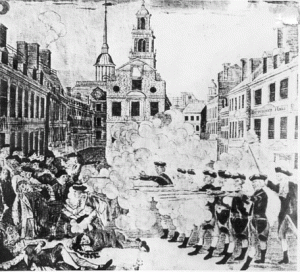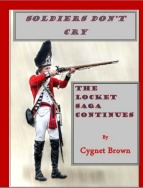Here is a scene from chapter 14 of my novel Soldier’s Don’t Cry of the oration on the 5th anniversary of the Boston Massacre on March 5, 1775. The heroine and patriot spy Elizabeth Thorton is in the balcony when this event unfolds. Elizabeth’s love interest British Army officer, Captain Phillip Randolph, is sitting in the front row with the other British Army officers.

Paul Revere’s rendition of the Boston Massacre of March 5, 1770. Five years later at the oration described in this story, Paul Revere was in the audience. A little over a month later, shots would be fired on Lexington Green.
As the time for the ceremony to start grew closer, the balcony filled until every seat in the place was full and people stood in the aisles. The main floor below continued to fill with spectators, and people began to sit on the floor in the aisles between the pews.
Elizabeth did not see Dr. Warren, who was the keynote speaker for the event, anywhere on the main floor, and she wondered how he would manage to get through the crowd up to the pulpit.
Elizabeth heard a thud outside the church at the front of the building. Then she saw the shape of a person outside the window behind the pulpit. It was Dr. Warren. She watched as Dr. Warren lifted the window and slid through it onto the stage. Apparently, the noise she had heard outside the church was a ladder that Dr. Warren had climbed so that he could come in through the window.
Dr. Warren stood tall. He straightened his clothing and went to stand behind the pulpit. A hush came over the boisterous crowd as its gaze fell upon the doctor. Before he even uttered a word, his appearance spoke volumes to a crowd of Americans steeped in the virtues of ancient Rome. Dr. Warren wore a toga, the principal garment of a freeborn Roman male citizen. It consisted of a single piece of material of irregular form—long, broad and flowing. It had no sleeves or armholes and covered his entire body except for his right arm. He wore the toga without any fastening device, so he had to keep his left arm crooked to support the massive drapery.
Elizabeth contrasted the toga to the stiff, tightly tailored coat, waistcoat and breeches of the British soldiers. The toga had no artifice, no false front, no deviant concealment; the only thing that separated the wearer’s body from his audience was his bent left arm. By wearing the garment, Dr. Warren thumbed a subtle nose of contempt at all that superficial finery with which corrupt Britain disguised its designs on American liberty and dignity. Warren was letting them know that he knew why they were at the ceremony, and he chose the garment specifically to antagonize them.
A few of the officers who sat on the steps, Gerald among them, hissed as Dr. Warren straightened his toga and confidently looked at his notes, which someone had placed on the pulpit. He cleared his throat. He began by acknowledging the officers who sat stiffly in front of him in their heavy red wool coats. Dr. Warren then acknowledged his fellow patriots. Elizabeth was pleased to see that he would not be intimidated.
As Warren spoke, Elizabeth saw that an officer sitting in the front row, who she knew to be Captain Chapman, was holding several pistol bullets in his open palm so that Dr. Warren could see them. True to the role of a great Roman hero, Dr. Warren calmly dropped a white handkerchief upon the officer’s hand and continued his oration. Cato had not done a better job when he took on the great and powerful Caesar. Virtue, in his lexicon, would always prevail over base power. Like the celebrated Roman politician, Dr. Warren was immune to the violent threats. Elizabeth was relieved when she did not hear him in any instance refer to the massacre as bloody.
Warren began his speech with a historical account of America’s early settlement, in order to “determine with what degree of justice the late Parliament of Great Britain has assumed the power of giving away that property which the Americans have earned by their labor.” He gave the Whig interpretation of colonial history, portraying a Manichean worldview in which “the tools of power in every age” confronted the benign power of liberty, embodied in his case by the Puritan ancestors. Those Puritans, “determined to find a place in which they might enjoy their freedom,” exercised liberty in America through a charter obtained significantly from the British monarch rather than Parliament. They “cultivated and defended” the continent “at an infinite expense of toil and blood” and thus contributed vastly to the British Empire’s greatness. Their serene prosperity, however, awakened “the madness of an avaricious minister” and brought about “the attempt of the British Parliament to raise revenue from America.” These misfortunes “brought upon the stage discord, envy, hatred and revenge, with civil war close in their rear.”
The speech, however, did not consist merely of a historical account of New England’s settlement. Warren provided a philosophical and ideological argument in defense of the colonists’ position. “Personal freedom is the natural right of every man,” he said, as was the right to hold “what he has honestly acquired by his own labor” and to “pursue that course which is the most conducive” to happiness. Hence, “no man, or body of men, can without being guilty of flagrant injustice, claim a right to dispose of the persons or acquisitions of any other man.” Warren continued with a celebration of the ancient Romans, who through self-effacing attitudes, “eminently conduced to the greatness of that state.”
Dr. Warren stepped back from the pulpit. A thunderous applause followed. As the applause began to die down, Dr. Warren took his a seat and Samuel Adams rose from his deacon’s seat and took his place at the pulpit.
“That was wonderful, Dr. Warren, simply wonderful,” he began. “I know that following an oration like the one Dr. Warren just gave would be difficult for anyone; however, I would like to know who would like to volunteer to speak at next year’s commemorative oration.”
Everyone sat looking at one another, and no hands went up.
“Come, come now, people; surely someone would like to give the oration at next year’s anniversary of that bloody massacre.”
As soon as the words were out of his mouth, Samuel Adams realized what he had said. His face turned pale.
The soldiers who sat at the front of the sanctuary began to call out “Fie! Fie!”
Elizabeth saw Gerald put his hand on the hilt of his glittering sword, lifting it from its sheath. She knew that someone had to do something quickly, or else the leaders of the Patriots would be arrested or worse.
“Fire,” she said aloud but under her breath.
“There’s a fire! There’s a fire!” Jonathan called out.
Members of the audience on the balcony joined Jonathan. Not realizing where the outcry originated, they began to panic and yell “Fire!” The audience on the main floor followed suit, and there was a mad, panicked rush toward the doors and stairs. Because not everyone could fit through the opened doors at exactly the same moment, in their rush to exit the building the crowd clogged the doors. The audience in the galleries, knowing that people on the main floor would reach the exit first, crowded out the windows and swarmed down gutters like rats in the street.
Peter and the rest of the Mayford family remained quietly in their seats and watched the chaos around them. Men were yelling, women were screaming, and babies were crying. The soldiers who had been yelling “Fie!”, but now were thinking that a fire had started on the balcony, abandoned their attempt to arrest the Patriot leaders and forced their way toward the doors to reach what they believed was safety. The selectmen eased themselves out the window and down the ladder that Dr. Warren had so conveniently provided.
Outside, as if on cue, the comedic melodrama unfolded further when Colonel Nesbit marched his troops past the Old South Church with his drummers and fifers playing loudly. Women screaming, children crying, men yelling, drummers drumming, fifers fifing, total mayhem broke out. No one was arresting anyone. The Patriot leaders escaped without harm.
Within a few minutes, the crowd inside the church thinned and the Mayford family rose and followed the last of the crowd out of the building through the main door. As Elizabeth followed Rachel down the balcony stairs, she thought that despite the chaotic ending, the affair went off with remarkable behavior on both sides.
As they came through the doors out into the sunshine, Phillip met them at the door. He immediately approached Elizabeth, looking worried. Elizabeth felt a twinge of guilt because she knew she was the one who had started the panic.
“Thank God, you’re safe,” Phillip said to Elizabeth as they walked away from the building. A crowd stood looking at the old church and looking at one another, vocalizing their wonder about where the fire was.
“I have something to say to you, young man,” said a short, fat, elderly woman with a cane who was bustling across the road to where Gerald and several other officers were standing. She did not blink an eye as she started shaking her cane at Gerald. Elizabeth did not know why the woman selected Gerald out of all the soldiers standing around, but the woman impressed her with her tenacity.
“I would like to put a ring in your nose! This is the army’s fault, you know. You had no business interrupting our solemn occasion!”
A younger woman came across the street and linked arms with the older woman. “Come along, Mother, we don’t need to make trouble where trouble does not need to be.”
“I am not trying to make trouble. If anyone has tried to make trouble, it was the king’s army,” the old woman countered. The young woman led the old woman away from the church.
Not Totally Fiction
Even though it is fictionalized, this is an adaptation of the actual incident on that fifth anniversary of the Boston Massacre. If you enjoyed this peek into Soldiers Don’t Cry, The Locket Saga Continues. It is available in Paperback or Kindle formats at Amazon.com.How did Elizabeth and Phillip become involved? Even more importantly, how do they (or do they?) resolve their differences? Are they simply star-crossed lovers doomed to life apart?
As mentioned in previous posts, I am currently working on the second draft of A Coward’s Solace the third book in The Locket Saga.
In addition to the fiction, I am also working on my first nonfiction book Simply Vegetable Gardening. For a sneak peek at the type of material in that book check out my hubs on hubpages. This week I added two gardening hubs. (Links below)
